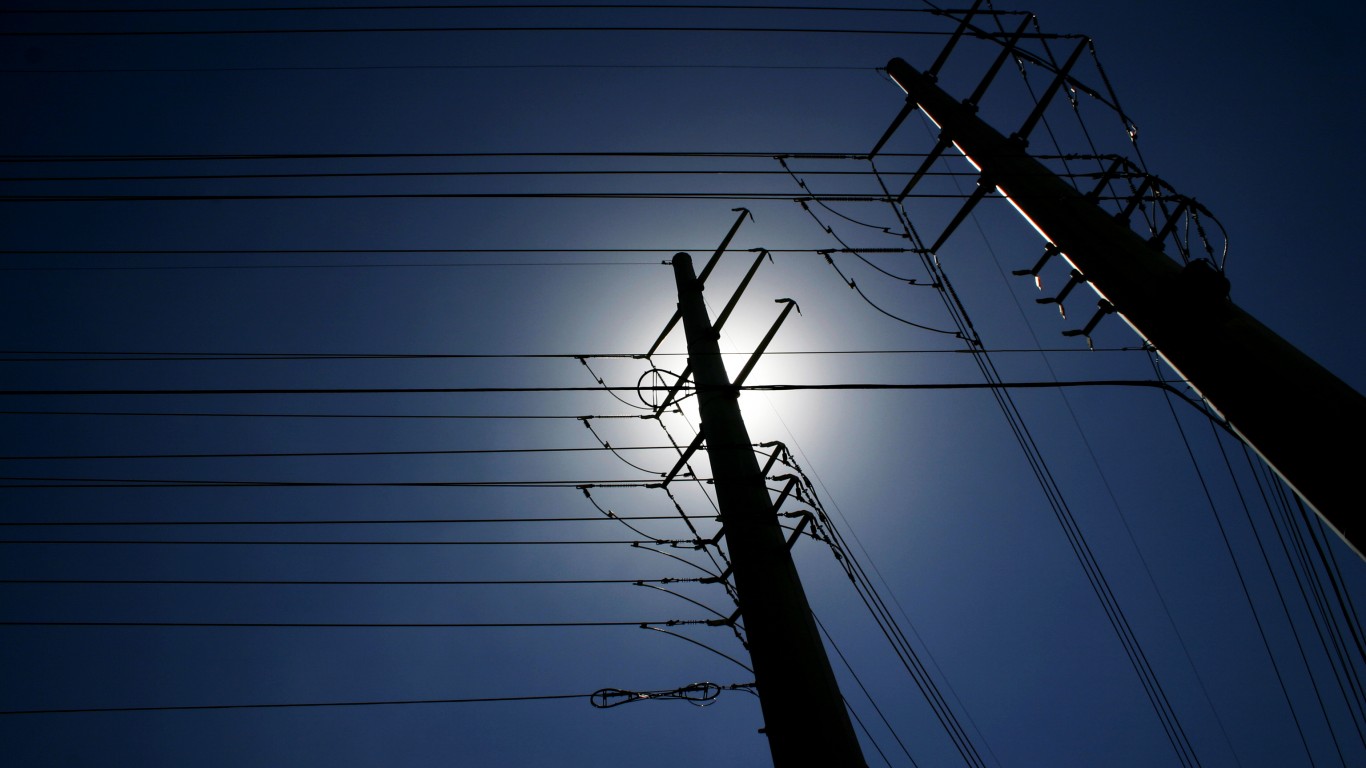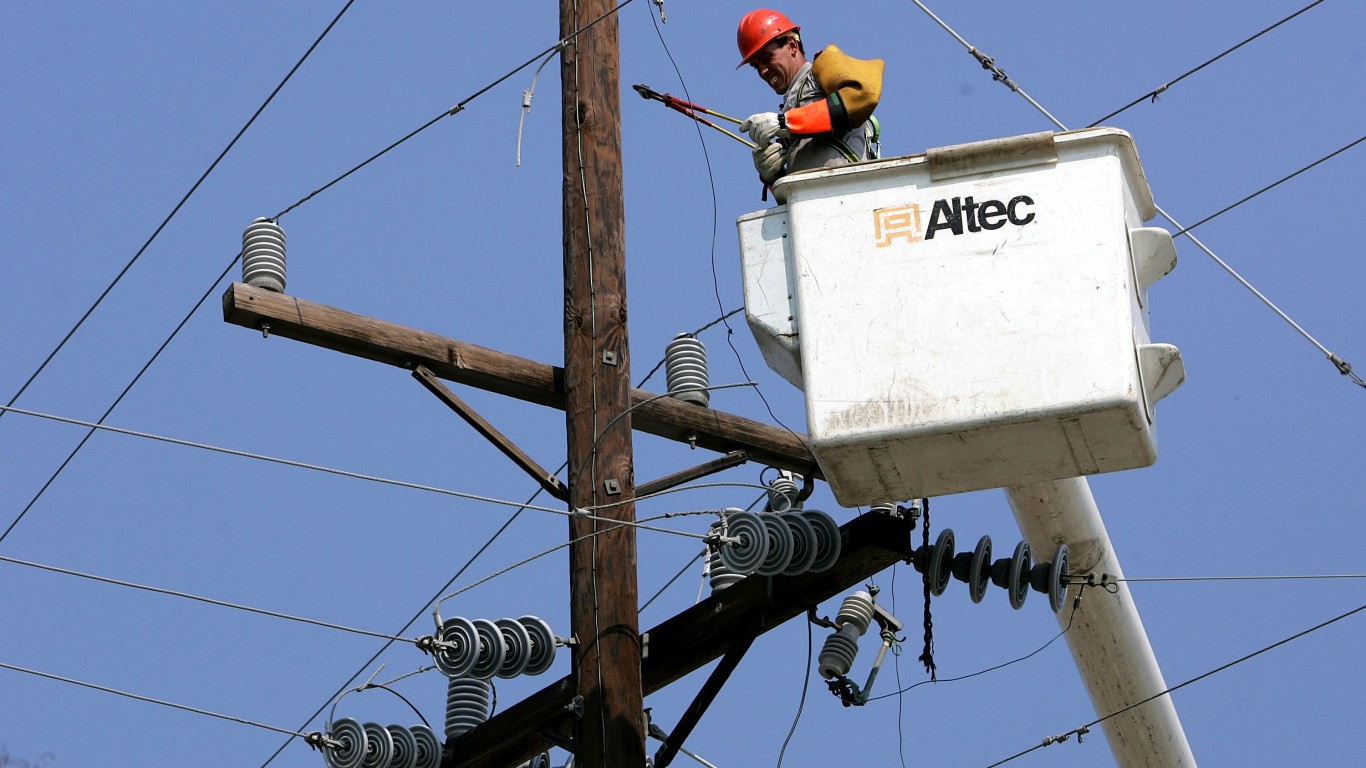Investing
Utility Stocks Are Going Nuclear: Wall Street Loves These High-Yield Dividend Champions

Published:

24/7 Wall St. Insights
Utility stocks have shined in 2024, up a stunning 23%. With interest rates set to fall for the rest of 2024 and perhaps as much as another 100-basis-point cut in 2025, growth and income investors will continue to load up on the sector. Top Wall Street utility analysts are quite bullish on the industry, which for years was only considered a viable investment for “widows and orphans.”
We have recently seen and reported on a fast-growing and strong trend: Big tech is starting to partner with major utility companies to advance the use of nuclear power to help bridge the widening gap between power generation and needs. Microsoft Corp. (NASDAQ: MSFT) and Constellation Energy Corp. (NYSE: CEG) are discussing reopening a closed-down reactor at 3 Mile Island, the site of the most significant U.S. nuclear accident in 1979, while Amazon.com Inc. (NASDAQ: AMZN) announced it has signed an agreement with Dominion Energy Inc. (NYSE: D), Virginia’s utility company, to explore the development of a small modular nuclear reactor, near Dominion’s existing North Anna nuclear power station.
Many of the top analysts on Wall Street in both the tech and utility sectors feel that the collaboration between tech stocks and electric utilities is the natural outcome of the tech industry’s increasing energy demands, a growing challenge to forge a commitment to sustainability, and the need for innovation in energy management and infrastructure.
We screened our 24/7 Wall Street utility sector database and found four top large-cap companies that could be next to hop in bed with a tech giant. All four pay big and dependable dividends and are Buy-rated at top Wall Street firms.

Equities will be hit if the major stock market indices significantly decline. However, history shows that stodgy utility stocks will likely hold their ground much better than high-flying technology stocks. With big tech looking for more energy to power artificial intelligence and data center needs, this sector should remain hot. With a product always in demand and the winter cold right around the corner, high-yielding utilities may also be the best idea now for worried investors.

This industry-leading utility pays investors a hefty 3.50% dividend. American Electric Power Co. Inc. (NYSE: AEP) is an electric public utility holding company that generates, transmits, and distributes electricity for sale to retail and wholesale customers in the United States.
It operates through:
The company generates electricity using:
It also supplies and markets electric power wholesale to other electric utility companies, rural electric cooperatives, municipalities, and other market participants.

Many of the Wall Street firms we cover are still very positive on utilities, and this company, as mentioned earlier, is working with big tech and pays a strong 4.46% dividend. Dominion Energy Inc. (NYSE: D) operates through four segments:
The Dominion Energy Virginia segment generates, transmits, and distributes regulated electricity to residential, commercial, industrial, and governmental customers in Virginia and North Carolina.
The Gas Distribution segment engages in:
The Dominion Energy South Carolina segment generates, transmits, and distributes electricity and natural gas to residential, commercial, and industrial customers in South Carolina.
The company’s portfolio of assets included approximately:
Dominion serves approximately 7 million customers.

This company is an industry leader and offers shareholders a solid 3.46% dividend. Dike Energy Inc. (NYSE: DUK) and its subsidiaries operate as an energy company in the United States. It operates through two segments:
The EU&I segment generates, transmits, distributes, and sells electricity in the Carolinas, Florida, and the Midwest. It generates electricity through:
This segment also sells electricity to municipalities, electric cooperative utilities, and load-serving entities.
The GU&I segment distributes natural gas to residential, commercial, industrial, and power generation customers and invests in pipeline transmission projects, renewable natural gas projects, and natural gas storage facilities.

This company serves eight states in the Midwest and pays shareholders a very dependable 3.42% dividend. Xcel Energy Inc. (NASDAQ: XEL), through its subsidiaries, generates, purchases, transmits, distributes, and sells electricity.
It operates through:
The company generates electricity through:
It also purchases, transports, distributes, and sells natural gas to retail customers and transports customer-owned natural gas. In addition, the company develops and leases natural gas pipelines and storage and compression facilities, invests in rental housing projects and nonregulated assets, and procures equipment for the construction of renewable generation facilities.
It serves residential, commercial, and industrial customers in:
Our 4 Top Ultra-High-Yield Dividend Picks for October and All Pay 12% and More
Choosing the right (or wrong) time to claim Social Security can dramatically change your retirement. So, before making one of the biggest decisions of your financial life, it’s a smart idea to get an extra set of eyes on your complete financial situation.
A financial advisor can help you decide the right Social Security option for you and your family. Finding a qualified financial advisor doesn’t have to be hard. SmartAsset’s free tool matches you with up to three financial advisors who serve your area, and you can interview your advisor matches at no cost to decide which one is right for you.
Click here to match with up to 3 financial pros who would be excited to help you optimize your Social Security outcomes.
Have questions about retirement or personal finance? Email us at [email protected]!
By emailing your questions to 24/7 Wall St., you agree to have them published anonymously on a673b.bigscoots-temp.com.
By submitting your story, you understand and agree that we may use your story, or versions of it, in all media and platforms, including via third parties.
Thank you for reading! Have some feedback for us?
Contact the 24/7 Wall St. editorial team.